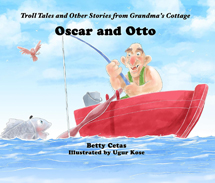by Betty Cetas
Windy Sea Publishing
book review by Mark Heisey
“…Otto was very heavy from all the worms he’d been eating. With a final tug, Otto pulled Oscar into the lake. And again Otto swam away, laughing.”
From the outset, Oscar and Otto are destined for confrontation. Oscar loves to fish, while Otto loves to trick fishermen. One day, Oscar’s fishing takes a turn. He keeps putting worms on the line, getting a nibble, but hooking no fish. He soon runs out of worms. While sitting in wonder in his boat, Otto approaches, thanks Oscar for all the worms, then splashes him and laughs as he swims away. Of course, this angers Oscar. He begins to plan and plot, but Otto still seems to get the best of him, and Oscar ends up falling out of the boat into the lake. Meanwhile, Otto is bragging more and more to his friends. Finally, Oscar comes up with a more devious plan and hooks Otto. Although Otto gets away, he is no longer bragging as he has a hook stuck in his mouth. When winter comes, Oscar is still fuming and making plans, while Otto has trouble eating. When Oscar forgets to be cautious and falls through the ice, Otto has a decision to make as he sees Oscar fighting fearfully to find a way back to the surface.
Cetas’ book is the classic story of two crafty individuals at odds. Each attempts to outsmart the other in their struggle for dominance, and each sees the other as the enemy. There is a line in the book about the pair learning “…that friendship was much more fun than fighting.” Reading this quote instantly parallels this work with Mark Sperring’s delightful book, The Sunflower Sword. Each of these picture books has brightly colored illustrations with slightly cartoony characters who feel they must fight each other. Sperring’s book features a boy—a young knight—who wants to go and fight dragons, but his mother gives him a sunflower to wield instead of a sword. Eventually, the knight and the dragon become friends and lead others to do the same. Both books focus on the theme of enemies becoming friends and both show friendships enduring over time.
Cetas’ book is well-written, and she does a good job of introducing her targeted age group to new vocabulary without overwhelming them. Typically, once introduced, the new word will be used repeatedly to reinforce its meaning and familiarity. Also, one of her strengths lies in setting up tension in the story, mostly through sentence structure, then pulling the line taut and hooking her readers. Additionally, the repetition of phrases, like “…and nibbled” or “and up, and up!” contrasting with “and down, and down!” is dealt with deftly, showing an intuitive knowledge of picture book construction that comes with years of practice and reading. The inclusion of ice fishing does a nice job of creating a unique sense of place. Meanwhile, the illustrations by Ugur Kose serve to enhance the book’s appeal. This work will find an easy spot on the shelves of children’s bookcases and classroom stacks and could be one often requested for a read-aloud. Caregivers and teachers are offered a lot of material in Cetas’ picture book to create lessons around or to host discussions.
A 2024 Eric Hoffer Book Award Grand Prize Short List book, including a First Horizon Award Finalist

